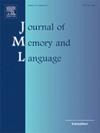基于相似度的干扰在汉语分类词-名词依存关系加工中的作用
IF 3
1区 心理学
Q1 LINGUISTICS
引用次数: 0
摘要
在语言依赖的处理过程中,非依赖词(即干扰物)的存在有时会使正确主语的识别复杂化。这种现象被称为基于相似性的干扰,为句子处理的竞争理论提供了一个有价值的试验场,并在心理语言学领域引起了极大的兴趣。一个突出的理论是基于线索的检索,它建议解析器根据一组检索线索在检索站点(例如,动词)启动对相关语言依赖的搜索。在本研究中,我们探讨了分类器在汉语名词依存词检索中的词典特定线索的使用,为基于线索的检索机制提供证据。一个进一步开放的问题是,干扰物是否必须在相互依赖的元素之间进行干预(所谓的追溯干扰),或者干扰物是否可以出现在依赖元素的左侧(所谓的主动干扰)。先前的研究表明,主动干扰比追溯干扰弱,即干扰物必须在共同依赖者之间进行干预,以影响依赖完成过程。使用自定节奏阅读和迷宫任务,并使用贝叶斯因子进行假设检验,我们发现在回溯配置中预测干扰效应的有力证据,但在主动配置中没有干扰。我们讨论了当前工作对检索和句子处理理论的理论意义。本文章由计算机程序翻译,如有差异,请以英文原文为准。
Similarity-based interference in the processing of classifier-noun dependencies in Mandarin Chinese
During the processing of linguistic dependencies, the presence of a non-dependent word—referred to as a distractor—can sometimes complicate the identification of the correct subject. This phenomenon, known as similarity-based interference, provides a valuable testing ground for competing theories of sentence processing and has garnered significant interest in the field of psycholinguistics. One prominent theory, cue-based retrieval, suggests that the parser initiates a search for the relevant linguistic dependent at the retrieval site (e.g., the verb) based on a set of retrieval cues. In this work, we explore the use of lexicon-specific cues set by classifiers in the retrieval of noun dependents in Mandarin Chinese to provide evidence for the cue-based retrieval mechanism. A further open question is whether the distractor must intervene between the co-dependents (so-called retroactive interference) or whether the distractor can appear to the left of the dependent elements (so-called proactive interference). Previous work has suggested that proactive interference is weaker than retroactive interference, i.e., that the distractor has to intervene between the co-dependents to influence the dependency completion process. Using self-paced reading and A-Maze tasks, and Bayes Factors for hypothesis testing, we found robust evidence for a predicted interference effect in retroactive configurations, but no interference in proactive configurations. We discuss the theoretical implications of the current work for theories of retrieval and sentence processing in general.
求助全文
通过发布文献求助,成功后即可免费获取论文全文。
去求助
来源期刊
CiteScore
8.70
自引率
14.00%
发文量
49
审稿时长
12.7 weeks
期刊介绍:
Articles in the Journal of Memory and Language contribute to the formulation of scientific issues and theories in the areas of memory, language comprehension and production, and cognitive processes. Special emphasis is given to research articles that provide new theoretical insights based on a carefully laid empirical foundation. The journal generally favors articles that provide multiple experiments. In addition, significant theoretical papers without new experimental findings may be published.
The Journal of Memory and Language is a valuable tool for cognitive scientists, including psychologists, linguists, and others interested in memory and learning, language, reading, and speech.
Research Areas include:
• Topics that illuminate aspects of memory or language processing
• Linguistics
• Neuropsychology.

 求助内容:
求助内容: 应助结果提醒方式:
应助结果提醒方式:


